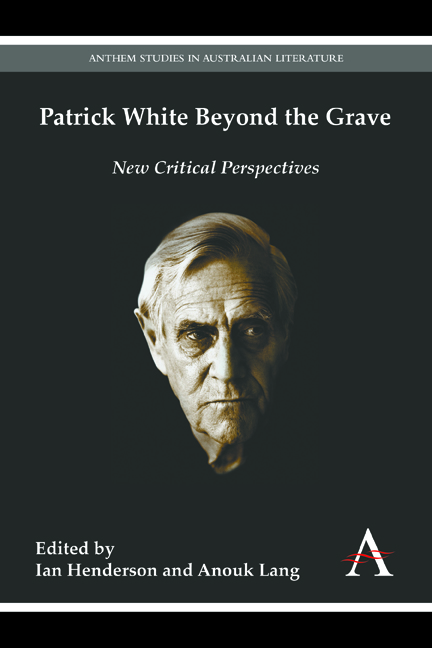Book contents
- Frontmatter
- Contents
- Acknowledgements
- Introduction
- Part I RESURRECTED PAPERS
- Part II MANY IN ONE
- Part III THE PERFORMANCE OF READING
- Chapter 7 Patrick White's Expressionism
- Chapter 8 The Doubling of Reality in Patrick White's The Aunt's Story and Paul Schreber's Memoirs of My Nervous Illness
- Chapter 9 Desperate, Marvellous Shuttling: White's Ambivalent Modernism
- Chapter 10 ‘Time and Its Fellow Conspirator Space’: Patrick White's A Fringe of Leaves
- Part IV QUEER WHITE
- Contributors
- Index
Chapter 9 - Desperate, Marvellous Shuttling: White's Ambivalent Modernism
from Part III - THE PERFORMANCE OF READING
Published online by Cambridge University Press: 18 January 2018
- Frontmatter
- Contents
- Acknowledgements
- Introduction
- Part I RESURRECTED PAPERS
- Part II MANY IN ONE
- Part III THE PERFORMANCE OF READING
- Chapter 7 Patrick White's Expressionism
- Chapter 8 The Doubling of Reality in Patrick White's The Aunt's Story and Paul Schreber's Memoirs of My Nervous Illness
- Chapter 9 Desperate, Marvellous Shuttling: White's Ambivalent Modernism
- Chapter 10 ‘Time and Its Fellow Conspirator Space’: Patrick White's A Fringe of Leaves
- Part IV QUEER WHITE
- Contributors
- Index
Summary
In the conclusion to his masterwork Minima Moralia (1962), Theodor Adorno meditated on the ‘irrationality’ of post–World War II culture. Modernism he claimed was governed by ‘occultism’, by a regressive form of deranged thinking in which a kind of banal supernaturalism offered emotional recompense for the shattered real. If the war had destroyed reason, if history was represented in camps, ruins, death and displacement, there were forms of delusional certainty that might offer another kind of authority, in this case unimpeachable because finally inscrutable. Just as Zygmunt Bauman asserted the ‘modernity’ of the Holocaust so Adorno suggests the grim register of modern times. ‘[T]he veiled tendency of society towards disaster,’ he argues, ‘lulls its victims in a false revelation, with a hallucinated phenomenon.’ Occultism in his terms refers to forms of the relinquishment of agency for fate, surrender to commodity fetishism (‘a world congealed into products’), a subject position characterized by paranoia and neurasthenia, and the substitution of fantasy, spectacle and superstition for reliable historical and material knowledge. In Adorno's later work he examined, as an ideological exemplar, the astrology columns of the Los Angeles Times, finding therein the confirmation of his sense that historical understanding had been converted through mass culture to alienated hocus pocus.
I wish to consider in this chapter how might we theorize the modernist irrational in the work of White – specifically in his immediate post-war novel, The Aunt's Story (1946) – but also to place it alongside an argument that respects and considers seriously the audacity of his images, the genuine claim of his work to a radical stylistics and a dissenting novelty. I want too to include recognition of the painterly aspiration of the imagery – preoccupied, to a large extent, with colour, abstraction, shapes and spatial form, which situates his phantasmagorias, his imagistic exorbitance, in the context not only of postcolonial modernisms, in dialogue with the visual arts, but also in a particular metaphysic of the image, not foundational or propositional, not subject to realist verification, but idealist, formalist and wrought (perhaps overwrought) with what we might call auratic confidence. Moreover since it is the hocus pocus, the spiritualism, that is often controversial in White's work, I want likewise to examine it afresh here, to ask how it is founded and by what narratorial logic it proceeds.
- Type
- Chapter
- Information
- Patrick White Beyond the GraveNew Critical Perspectives, pp. 155 - 162Publisher: Anthem PressPrint publication year: 2015



